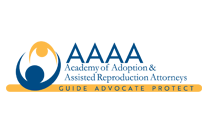The Nevada Supreme Court recently held that a lesbian who carried her partner’s biological child can pursue parental rights of the child she carried. The lower court had ruled that as a surrogate, she had no right to custody of the child. But the Nevada Supreme Court has allowed her to seek parental rights.
This is by no means an Intended Parent/Surrogate relationship. This was a personal relationship, although many news headline are referring to the lesbian partner who carried the child as a surrogate. In this case, the woman who gave birth to the child was the lesbian partner of the woman whose egg was fertilized by a sperm donor. Sha’Kayla St. Mary, who was the carrier, and Veronica Lynn Damon, whose egg was fertilized chose to have the child together while they were in a romantic relationship. According to St. Mary, the women determined that Damon would contribute the egg for in vitro fertilization with sperm through an anonymous donor, and that the resulting ovum would be implanted in St. Mary, in order that both of the women would have parental status. St. Mary would be the birth mother and Damon was the genetic mother. The women executed a co-parenting agreement in case they broke up, wherein they agreed they would both be a part of the child’s life, and would share in the responsibilities of raising the child.
St. Mary was listed on the birth certificate as the mother. After the the couple’s relationship ended, however, she executed an affidavit indicating that Damon was the genetic mother. Damon used the affidavit to get a court order declaring her the “biological and legal mother” of the child, and the birth certificate was amended accordingly. When St. Mary sought timesharing and child support, Damon stood behind the court order declaring her the legal mother. Unfortunately, the lower court treated St. Mary as a surrogate who had no legal or biological rights under state law. St. Mary appealed this ruling, and the Nevada Supreme Court reversed the court’s order unanimously. The Nevada Supreme Court held that a child could have two mothers and that a parenting agreement such as the one that they developed could be enforceable. This case has been remanded to the lower court to hear St. Mary’s argument.
When a same-sex couple chooses to pursue the use of assisted reproductive technology to create their family, it is important to establish the rights of both individuals. This could be through the pursuit of a second parent adoption for the partner that is not biologically related and/or the creation of a co-parenting agreement, in case the relationship ends. Although it might seem depressing to think about a relationship’s demise while preparing for such a joyous occasion as the birth of your child, it is best to be as thorough as possible so that all expectations and responsibilities are established beforehand. Pursuing a second parent adoption is most certainly essential, and can be done in Florida, through some legal maneuvering.






